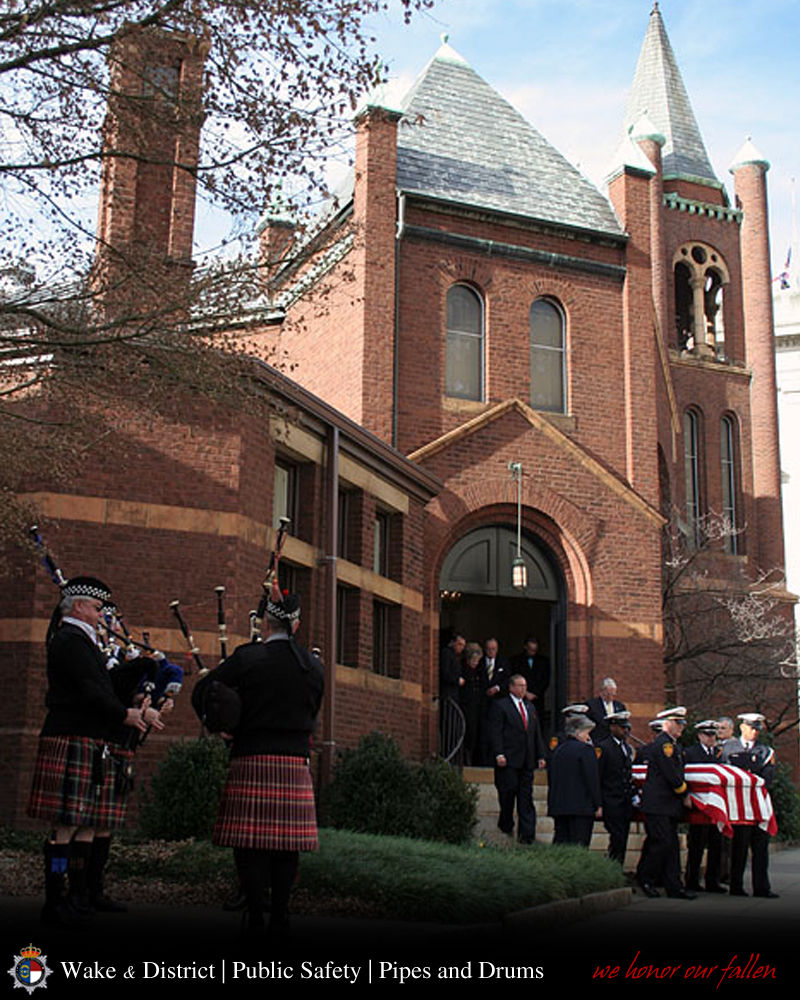Why Bagpipes?
- Wake and District
- Oct 23, 2021
- 3 min read
The tradition of bagpipes and drums played at fire department and police department funerals in the United States of America goes back over 150 years.

When the Irish and Scottish immigrated to the States, they brought many of their customs with them. One of these was the bagpipe, often played at Celtic weddings, funerals and Céilís.
Those who have been to funerals when bagpipes play, know how haunting and mournful the sound of the pipes can be. Before too long, families and friends of non-Irish firefighters and police officers began asking for pipe bands to play for these fallen heroes. The pipes and drums add a special air and dignity to the solemn occasion.
Today, the tradition is universal and not just for the Irish or Scottish. The pipes have come to be a distinguishing feature of a fallen hero’s funeral.

The Wake and District Public Safety Pipe and Drum band was formed in 2006, and originated out of the idea we need to better recognize and thank the individuals who risk their lives on a daily basis for the safety of the community. In addition to this goal this group strives to honor those heroes who have lost their lives in these endeavors.
These heroes are no longer with us. But we can tell you in our hearts, we will always remember and be grateful for your husband, your wife, your mother, your father, your sister, your brother, your daughter, your son.
We will make sure that their names and their memories live on in the hearts, minds, and souls of our community for generations to come.
This is our commitment. This is our duty.
Why do we play Balmoral So Much?
Why do public safety pipe bands play the tune Balmoral to honor their fallen comrades? In asking this question it is important to understand the history of tunes to garner understanding of why we play them.
The tune Balmoral was written by Sir Robert Bruce of the Gordon Highlanders. As a Scottish solider fighting in World War 2, Robert Bruce was captured during the Battle of Singapore in Malaysia along with many fellow soldiers. The Battle ended on April 9, 1942, when BritishLieutenant-General Arthur Ernest Percival surrendered to Japanese General Masaharu Homma; by this point 130,000 soldiers became Prisoners of War.
What followed was one of the worst atrocities in modern wartime history—In October 1942, the Japanese began to move POWs up to Thailand to build the Thai-Burma Railway which was their strategic solution to get supplies to their forces fighting the British in Burma.
Robert Bruce was forced to work on this railway and his movements were as follows:- Left Changi, Singapore in May 1943 – He was part of the notorious “H” Force which was treated very badly in Thailand and suffered very heavy casualties. Tonchan, Thailand - until November 1943 Sime Road, Singapore, – until May 1944 Changi, Singapore –until July 1944 Normanton, Singapore –until August 1945 Changi – August 1945 where he was liberated.
Sir Robert, then the Command Sgt Major of the Malay Regiment wrote this tune to honor those British and Allied soldiers who were killed or worked to death on this railway system.
Our thanks to Glenn Simpson, a retired Fire Chief with 36 years of service in New Jersey— for his assistance in providing background on this tune.

Balmoral is a stoic 3/4 march which became almost infamous in the film BACKDRAFT which featured a funeral scene wherein members of the Bagpipes and Drums of the Emerald Society, Chicago Fire Department played the tune to honor fallen firefighters.
On 19 November 2014 the Wake and District Pipe Band in Raleigh, NC received the following note from Carol Bruce Lynch — the daughter of the author of Balmoral – Sir Robert Bruce.
Loved your comments about “Balmoral”. My father would have been so proud to hear his music being played all over the world. I spent many nights listening to Balmoral being composed along with his many other pipe tunes. My dad was so talented musically and I believe composing his tunes helped him cope with the awful memories of his time as a Japanese P.O.W. My son who is also called Robert Bruce e-mailed me the article this afternoon. If you would like copies of any other tunes just let me know. Thanks again, Carol Bruce Lynch, Scotland.
Loved your comments about “Balmoral”. My father would have been so proud to hear his music being played all over the world. I spent many nights listening to Balmoral being composed along with his many other pipe tunes. My dad was so talented musically and I believe composing his tunes helped him cope with the awful memories of his time as a Japanese P.O.W. My son who is also called Robert Bruce e-mailed me the article this afternoon. If you would like copies of any other tunes just let me know. Thanks again, Carol Bruce Lynch, Scotland
Comments